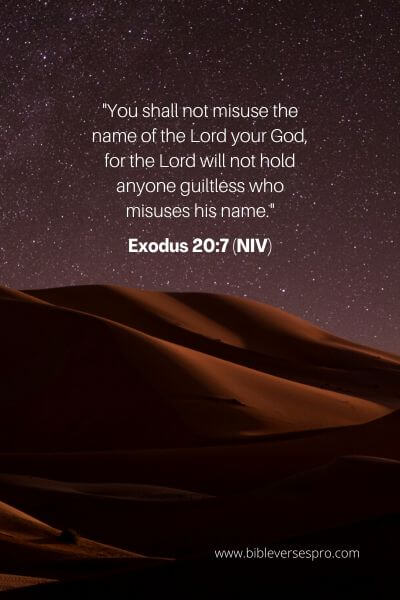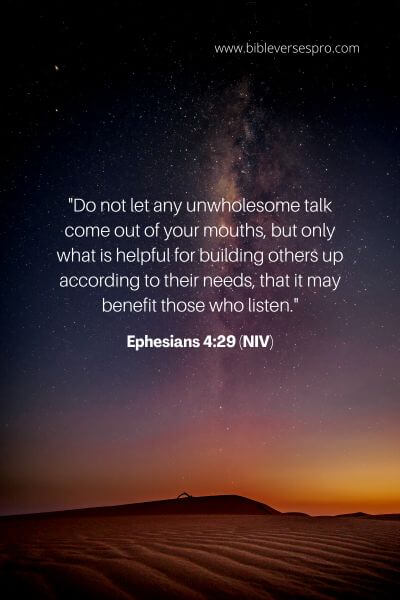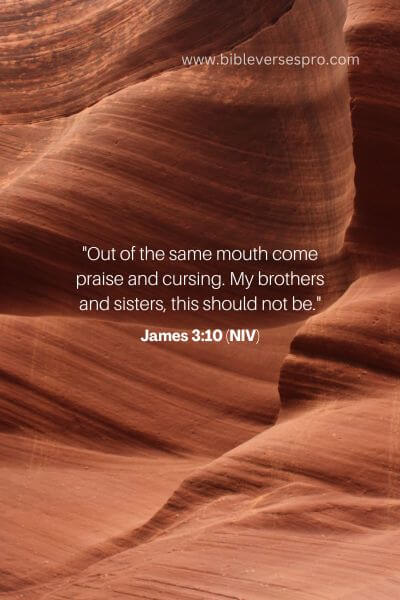Cursing, the use of profane or disrespectful language, is a topic addressed in the Bible with wisdom and caution.
Throughout its pages, the Bible offers guidance on the power of our words and the importance of using them for edification and encouragement.
While it acknowledges the human tendency to fall into the trap of cursing, the Bible also teaches the transformative power of God’s grace and the ability to cultivate a speech that reflects His love and righteousness.
In this compilation of 35 Bible verse on cursing, we will explore scriptures that shed light on the consequences of unwholesome language, the importance of controlling our tongues, and the transformative impact of speaking words of life.
What Is Swearing In The Bible?
Swearing on the Bible, also known as taking an oath on the Bible, is a practice that has been followed in various contexts and cultures for centuries.
It involves placing one’s hand on the Bible and making a solemn declaration, often in a legal or formal setting, to affirm the truthfulness of one’s statements or commitments.
This act is often seen as a way to invoke the sacredness and authority of the Bible as a symbol of truth and divine witness.
The act of swearing on the Bible has its roots in biblical traditions and references.
In the Old Testament, oaths were taken by placing one’s hand under the thigh of another person or by invoking the name of God as a witness to the truthfulness of one’s words or promises.
In some instances, physical objects or sacred items were used as tangible symbols of the oath.
What The Bible Says About Cursing And Swearing
The Bible offers clear guidance on the subject of cursing and swearing, highlighting the importance of our words and the impact they have on ourselves and others.
It addresses not only the use of profanity but also the careless and frivolous manner in which we may swear or make oaths.
Let us explore what the Bible says about cursing and swearing, understanding its teachings and principles that can shape our speech and conduct.
Ephesians 4:29 (NIV)“Do not let any unwholesome talk come out of your mouths, but only what is helpful for building others up according to their needs, that it may benefit those who listen.”
This verse reminds us to guard our speech and refrain from using words that are unwholesome, harmful, or offensive. Instead, our words should be used to encourage, edify, and bless others.
Matthew 5:37 (NIV) “All you need to say is simply ‘Yes’ or ‘No’; anything beyond this comes from the evil one.”
Jesus teaches us to be people of integrity, letting our words be truthful and trustworthy. Making excessive oaths or swearing unnecessarily may come from a place of deception or a lack of trustworthiness.
James 5:12 (NIV) “Above all, my brothers and sisters, do not swear—not by heaven or by earth or by anything else. All you need to say is a simple ‘Yes’ or ‘No.’ Otherwise, you will be condemned.”
James echoes the teaching of Jesus, urging believers not to swear oaths or make promises that go beyond a simple affirmation or denial. This underscores the importance of keeping our word and being people of honesty and reliability.
Colossians 3:8 (NIV)“But now you must also rid yourselves of all such things as these: anger, rage, malice, slander, and filthy language from your lips.”
This verse emphasizes the need to eliminate sinful speech from our lives, including cursing and using foul or offensive language. As followers of Christ, our words should reflect His love, grace, and purity.
Proverbs 21:23 (NIV)
“Those who guard their mouths and their tongues keep themselves from calamity.”
This proverb reminds us of the power of our words and the consequences that can result from careless or harmful speech. By exercising self-control over our tongues, we can avoid unnecessary trouble and maintain healthy relationships.
Proverbs 15:1 (NIV) “A gentle answer turns away wrath, but a harsh word stirs up anger.”
This proverb highlights the importance of speaking with gentleness and kindness. It encourages us to choose our words wisely, as they have the power to either diffuse conflicts or escalate them.
Matthew 12:36-37 (NIV)“But I tell you that everyone will have to give account on the day of judgment for every empty word they have spoken. For by your words you will be acquitted, and by your words you will be condemned.”
Jesus reminds us of the gravity of our words and the accountability we have for what we say. It reinforces the need to use our speech responsibly and with consideration for its impact on ourselves and others.
Bible Verse On Cursing
Cursing, the use of profanity or offensive language, goes against the teachings and principles found in the Bible. God calls His people to honor Him with their words, reflecting His character and spreading goodness.
The Bible provides guidance and wisdom on the subject of cursing, reminding us of the power of our words and the importance of using them in a way that edifies and honors God.
Let’s explore ten Bible verses that address cursing, understanding their teachings, and their relevance in our lives.
Exodus 20:7 (NIV) – Never Misuse The Name Of God
“You shall not misuse the name of the Lord your God, for the Lord will not hold anyone guiltless who misuses his name.”
Ephesians 4:29 (NIV) – Be Mindful Of What You Say
“Do not let any unwholesome talk come out of your mouths, but only what is helpful for building others up according to their needs, that it may benefit those who listen.”
Colossians 3:8 (NIV) – Get Rid Of Anger
“But now you must also rid yourselves of all such things as these: anger, rage, malice, slander, and filthy language from your lips.”
James 3:10 (NIV) – Use Your Mouth To Praise God
“Out of the same mouth come praise and cursing. My brothers and sisters, this should not be.”
Psalm 141:3 (NIV) – Watch Your Lips
“Set a guard over my mouth, Lord; keep watch over the door of my lips.”
Proverbs 4:24 (NIV) – Don’t Speak Corrupt Words
“Keep your mouth free of perversity; keep corrupt talk far from your lips.”
Matthew 12:36-37 (NIV) – We Will All Give Account Of Our Actions
“But I tell you that everyone will have to give account on the day of judgment for every empty word they have spoken. For by your words you will be acquitted, and by your words you will be condemned.”
Proverbs 15:4 (NIV) – Our Tongue Carries Life And Death
“The soothing tongue is a tree of life, but a perverse tongue crushes the spirit.”
James 1:26 (NIV) – Live a Righteous Life
“Those who consider themselves religious and yet do not keep a tight rein on their tongues deceive themselves, and their religion is worthless.”
Psalm 19:14 (NIV) – Let Your Thoughts And Actions Be Pleasant to The Lord
“May these words of my mouth and this meditation of my heart be pleasing in your sight, Lord, my Rock and my Redeemer.”
Bible Verse On Cursing Parents
The Bible places great emphasis on honoring and respecting our parents, recognizing their authority and the role they play in our lives.
Cursing parents, which involves speaking harmful or disrespectful words towards them, is strongly condemned in Scripture. Instead, we are called to honor and show love to our parents, even in times of difficulty or disagreement.
Here are five Bible verses that address the importance of honoring and not cursing parents
Exodus 20:12 (NIV)
“Honor your father and your mother, so that you may live long in the land the Lord your God is giving you.”
Ephesians 6:1-3 (NIV)
“Children, obey your parents in the Lord, for this is right. ‘Honor your father and mother’—which is the first commandment with a promise—’so that it may go well with you and that you may enjoy long life on the earth.'”
Proverbs 23:22 (NIV)
“Listen to your father, who gave you life, and do not despise your mother when she is old.”
Colossians 3:20 (NIV)
“Children, obey your parents in everything, for this pleases the Lord.”
Leviticus 19:3 (NIV)
“Each of you must respect your mother and father, and you must observe my Sabbaths. I am the Lord your God.”
Bible Verse On Cursing The Fig Tree
In the Gospels, there is an account of Jesus encountering a fig tree that appeared to have leaves but no fruit.
As a symbol of spiritual barrenness, Jesus cursed the fig tree, and it withered immediately.
This event carries a deeper message about the importance of bearing spiritual fruit in our lives. Here are five Bible verses that relate to the incident of cursing the fig tree:
Matthew 21:19 (NIV)
“Seeing a fig tree by the road, he went up to it but found nothing on it except leaves. Then he said to it, ‘May you never bear fruit again!’ Immediately the tree withered.”
Mark 11:13-14 (NIV)
“Seeing in the distance a fig tree in leaf, he went to find out if it had any fruit. When he reached it, he found nothing but leaves because it was not the season for figs. Then he said to the tree, ‘May no one ever eat fruit from you again.’ And his disciples heard him say it.”
Mark 11:20-21(NIV)
“In the morning, as they went along, they saw the fig tree withered from the roots. Peter remembered and said to Jesus, ‘Rabbi, look! The fig tree you cursed has withered!'”
Luke 13:6-9 (NIV)
“Then he told this parable: ‘A man had a fig tree growing in his vineyard, and he went to look for fruit on it but did not find any. So he said to the man who took care of the vineyard, ‘For three years now I’ve been coming to look for fruit on this fig tree and haven’t found any. Cut it down! Why should it use up the soil?’ ‘Sir,’ the man replied, ‘leave it alone for one more year, and I’ll dig around it and fertilize it. If it bears fruit next year, fine! If not, then cut it down.'”
John 15:1-2 (NIV)
“I am the true vine, and my Father is the gardener. He cuts off every branch in me that bears no fruit, while every branch that does bear fruit he prunes so that it will be even more fruitful.”
Bible Verse On Not Cursing
The Bible emphasizes the importance of our words and encourages us to use them wisely and responsibly. Cursing, in the context of speaking harmful or negative words, is discouraged in Scripture.
Instead, we are called to speak words of blessing, encouragement, and love. Here are five Bible verses that highlight the significance of refraining from cursing and using our words for good:
Proverbs 18:21 (NIV)
“The tongue has the power of life and death, and those who love it will eat its fruit.”
Ephesians 4:29 (NIV)
“Do not let any unwholesome talk come out of your mouths, but only what is helpful for building others up according to their needs, that it may benefit those who listen.”
James 3:9-10 (NIV)
“With the tongue we praise our Lord and Father, and with it we curse human beings, who have been made in God’s likeness. Out of the same mouth come praise and cursing. My brothers and sisters, this should not be.”
Matthew 5:44 (NIV)
“But I tell you, love your enemies and pray for those who persecute you.”
Colossians 3:8 (NIV)
“But now you must also rid yourselves of all such things as these: anger, rage, malice, slander, and filthy language from your lips.”
Bible Verses For Profanity
The Bible provides guidance on our speech and encourages us to use language that is wholesome, edifying, and honorable.
Profanity, which involves using offensive or disrespectful language, goes against the principles of love, respect, and purity that the Bible teaches.
Instead, we are called to speak words that reflect godliness and bring encouragement to others. Here are five Bible verses that address the importance of avoiding profanity
These verses remind us of the importance of guarding our speech and using our words to bring honor to God and uplift others.
Colossians 3:8 (NIV)
“But now you must also rid yourselves of all such things as these: anger, rage, malice, slander, and filthy language from your lips.”
Ephesians 4:29 (NIV)
“Do not let any unwholesome talk come out of your mouths, but only what is helpful for building others up according to their needs, that it may benefit those who listen.”
Matthew 15:11(NIV)
“What goes into someone’s mouth does not defile them, but what comes out of their mouth, that is what defiles them.”
James 3:9-10 (NIV)
“With the tongue, we praise our Lord and Father, and with it we curse human beings, who have been made in God’s likeness. Out of the same mouth come praise and cursing. My brothers and sisters, this should not be.”
Colossians 4:6 (NIV)
“Let your conversation be always full of grace, seasoned with salt, so that you may know how to answer everyone.”
Bible Verse On Do Not Swear On Anything
The Bible provides guidance on the importance of integrity and truthfulness in our speech.
Swearing on anything or making false oaths goes against the principles of honesty and trustworthiness that God desires for His people.
Instead, we are called to let our “yes” be yes and our “no” be no. Here are five Bible verses that address the significance of refraining from making false oaths or swearing on anything:
Matthew 5:33-37 (NIV)
“Again, you have heard that it was said to the people long ago, ‘Do not break your oath, but fulfill to the Lord the vows you have made.’ But I tell you, do not swear an oath at all: either by heaven, for it is God’s throne; or by the earth, for it is his footstool; or by Jerusalem, for it is the city of the Great King. And do not swear by your head, for you cannot make even one hair white or black. All you need to say is simply ‘Yes’ or ‘No’; anything beyond this comes from the evil one.”
James 5:12 (NIV)
“Above all, my brothers and sisters, do not swear—not by heaven or by earth or by anything else. All you need to say is a simple ‘Yes’ or ‘No.’ Otherwise, you will be condemned.”
Leviticus 19:12 (NIV)
“Do not swear falsely by my name and so profane the name of your God. I am the Lord.”
Numbers 30:2 (NIV)
“When a man makes a vow to the Lord or takes an oath to obligate himself by a pledge, he must not break his word but must do everything he said.”
Zechariah 8:17 (NIV)
“Do not plot evil against each other, and do not love to swear falsely. I hate all this,” declares the Lord.
Conclusion
The Bible clearly teaches us the importance of honoring and respecting our parents and strongly condemns cursing them with harmful or disrespectful words. Rather, we are called to show love and honor to our parents, even in difficult situations.
These verses remind us that our relationships with our parents are significant and that how we treat them can have long-lasting consequences.
May we always seek to honor and show love to our parents, as we live out the commandments and teachings of Scripture.

















